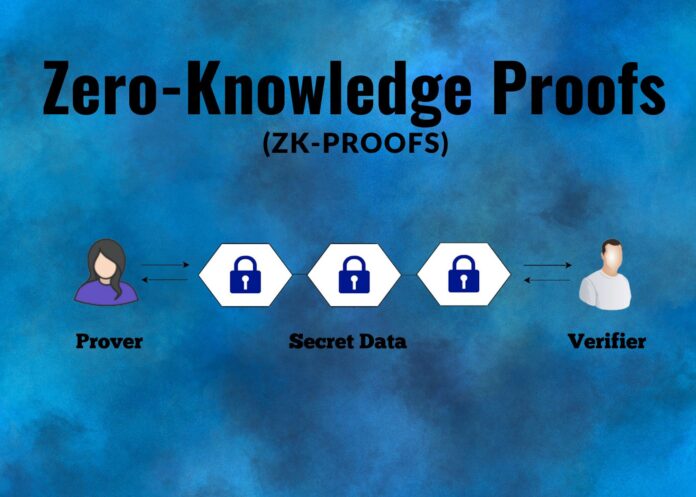Zero-Knowledge (ZK) proofs have emerged as a revolutionary concept that promises to enhance privacy, security, and scalability. ZK proofs involve the principle of “proving without revealing.”
This seemingly paradoxical concept enables a prover to demonstrate the possession of certain knowledge or credentials without disclosing the actual details of that knowledge.
This powerful feature has far-reaching implications for various applications, including blockchain networks, privacy-preserving systems, and secure authentication protocols.
How Zero-Knowledge Proofs Work
ZK proofs involve a series of interactions between two parties: the prover and the verifier. The prover aims to convince the verifier that a given statement is true. It does so without revealing any additional information beyond the validity of the statement itself.
The process typically involves the following steps:
- Commitment: The prover constructs a commitment, which is a cryptographic representation of the statement they wish to prove. This commitment then goes to the verifier.
- Challenge: The verifier responds by sending a random challenge to the prover. This challenge helps to test the prover’s knowledge and ensure that they cannot simply guess the solution.
- Response: The prover constructs a response depending on the challenge and their knowledge of the statement. This response is sent to the verifier.
- Verification: The verifier checks the response against the initial commitment and the challenge. If the response is valid, the verifier is convinced of the statement’s validity without learning additional information about it.
This process repeats multiple times to increase the confidence level of the verification. The beauty of ZK proofs lies in the fact that even if the verifier knows the statement, they cannot deduce the specifics of the prover’s knowledge or credentials from the interactions.
Applications of Zero-Knowledge Proofs
ZK proofs have a wide range of applications across various domains, including:
- Blockchain and Cryptocurrencies: ZK proofs enhance the privacy and scalability of blockchain networks. Projects like Zcash and Tornado Cash leverage ZK proofs to enable anonymous transactions and ensure privacy for users.
- Identity Management and Authentication: ZK proofs help identity management systems to verify credentials without revealing sensitive personal information. This can be particularly useful in scenarios concerning privacy, such as online voting or secure authentication.
- Supply Chain and Provenance Tracking: ZK proofs can help in supply chain management and provenance tracking systems to verify the authenticity of products or materials without disclosing sensitive information about the supply chain processes.
- Cloud Computing and Data Privacy: In cloud computing environments, ZK proofs enable secure computation and data sharing while preserving the privacy of sensitive data.
- Decentralized Finance (DeFi): ZK proofs enable privacy-preserving financial transactions and ensure the integrity of smart contracts.
Zero-Knowledge Proof Systems
Several ZK-proof systems have been developed over the years, each with its own strengths and trade-offs. Some of the notable ZK-proof systems include:
- zk-SNARKs (Zero-Knowledge Succinct Non-Interactive Argument of Knowledge): zk-SNARKs are a type of ZK proof system that allows for succinct proofs and non-interactive verification.
- zk-STARKs (Zero-Knowledge Scalable Transparent Arguments of Knowledge): zk-STARKs are another type of ZK proof system that focuses on transparency and scalability.
- Bulletproofs: Bulletproofs are a type of ZK proof system that is particularly efficient for proving knowledge of committed values, making them well-suited for blockchain and cryptocurrency applications.
- Sonic: Sonic is a recent ZK proof system that aims to achieve both transparency and scalability while maintaining high efficiency. It is being actively researched and developed for various privacy-preserving applications.
The Future of Zero-Knowledge Proofs
As the demand for privacy, security, and scalability continues to grow, ZK proofs are playing an increasingly significant role in various domains. Ongoing research and development efforts focus on improving the efficiency, practicality, and applicability of ZK proofs.
One exciting area of exploration is the integration of ZK proofs with emerging technologies like quantum computing and post-quantum cryptography. This could lead to even more secure and robust ZK-proof systems. They are resilient against potential attacks from quantum computers.
Furthermore, the adoption of ZK proofs in mainstream applications and services could drive increased user awareness and adoption, further fueling the growth and development of this technology.
Conclusion
Zero-Knowledge (ZK) proofs are a revolutionary cryptographic concept that enables proving the validity of statements without revealing any additional information.
With their potential to enhance privacy, security, and scalability, ZK proofs have implementations in various domains, including blockchain, identity management, supply chain tracking, and cloud computing.
As the demand for privacy-preserving technologies continues to rise, ZK proofs play a crucial role in shaping the future of secure and privacy-centric systems.
By enabling “proving without revealing,” ZK proofs offer a powerful solution for balancing transparency and confidentiality, paving the way for a more secure and trustworthy digital landscape.



